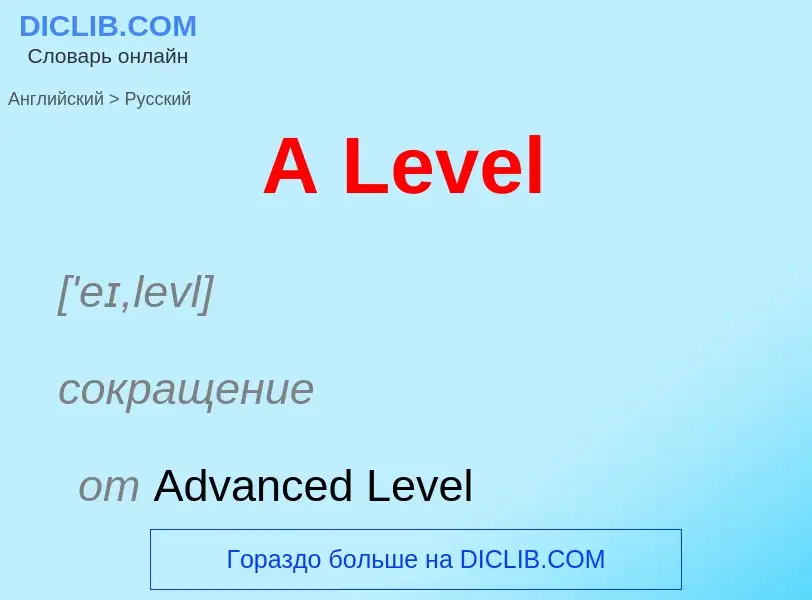Перевод и анализ слов искусственным интеллектом ChatGPT
На этой странице Вы можете получить подробный анализ слова или словосочетания, произведенный с помощью лучшей на сегодняшний день технологии искусственного интеллекта:
- как употребляется слово
- частота употребления
- используется оно чаще в устной или письменной речи
- варианты перевода слова
- примеры употребления (несколько фраз с переводом)
- этимология
A Level - перевод на Английский
['eɪ,levl]
сокращение
от Advanced Level
[əd'vɑ:nst,levl]
общая лексика
экзамен по программе средней школы на повышенном уровне (сдаётся по окончании шестого класса [sixth form])
экзамен по программе средней школы на повышенном уровне (сдаётся по окончании шестого класса в Великобритании)
полное выражение
General Certificate of Secondary Education Examination Advanced Level
синоним
Определение
Википедия
The A-Level (Advanced Level) is a subject-based qualification conferred as part of the General Certificate of Education, as well as a school leaving qualification offered by the educational bodies in the United Kingdom and the educational authorities of British Crown dependencies to students completing secondary or pre-university education. They were introduced in England and Wales in 1951 to replace the Higher School Certificate. The A-level permits students to have potential access to university if their grade is of satisfactory quality.
A number of Commonwealth countries have developed qualifications with the same name as and a similar format to the British A Levels. Obtaining an A Level, or equivalent qualifications, is generally required across the board for university entrance, with universities granting offers based on grades achieved. Particularly in Singapore, its A level examinations have been regarded as being much more challenging than the United Kingdom, with most universities offering lower entry qualifications with regard to grades achieved on a Singaporean A level certificate.
A Levels are typically worked towards over two years. Normally, students take three or four A Level courses in their first year of sixth form, and most taking four cut back to three in their second year. This is because university offers are normally based on three A Level grades, and taking a fourth can have an impact on grades. Unlike other level-3 qualifications, such as the International Baccalaureate, A Levels have no specific subject requirements, so students have the opportunity to combine any subjects they wish to take. However, students normally pick their courses based on the degree they wish to pursue at university: most degrees require specific A Levels for entry.
In legacy modular courses (last assessment Summer 2019), A Levels are split into two parts, with students within their first year of study pursuing an Advanced Subsidiary qualification, commonly referred to as an AS or AS Level, which can either serve as an independent qualification or contribute 40% of the marks towards a full A Level award. The second part is known as an A2 or A2 Level, which is generally more in-depth and academically rigorous than the AS. The AS and A2 marks are combined for a full A Level award. The A2 Level is not a qualification on its own, and must be accompanied with an AS Level in the same subject for certification.

